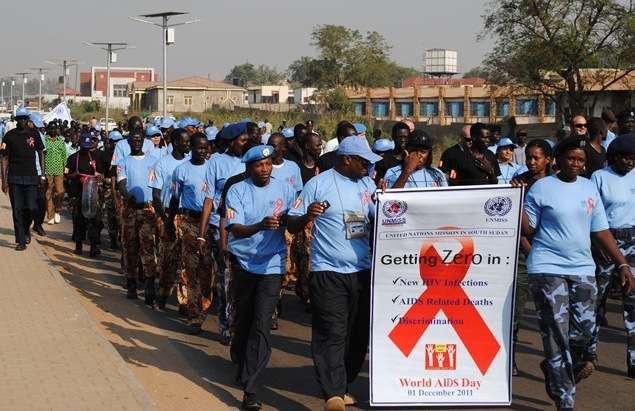IOM supports HIV/Aids prevention in war-torn S. Sudan
November 2, 2016 (JUBA) – The International Organisation for Migration (IOM) says it is working with vulnerable populations across South Sudan to reduce the risk of transmission of HIV/AIDS, increase access to treatment, care and support services.

With support from the Global Fund to Fight AIDS, Tuberculosis and Malaria, IOM says its prevention programmes aim to reduce the prevalence and incidence of HIV in South Sudan among key populations, more vulnerable to the deadly disease.
“As part of the prevention programme, IOM has trained 177 peer counselors within communities to conduct outreach activities and encourage uptake of key HIV prevention, treatment, care and support activities,” IOM said in a statement.
Working in coordination with the United Nations refugee agency (UNHCR), IOM organized an event on World Aids Day, during which its teams assessed the level of awareness and access to HIV and AIDS services among displaced populations in refugee camps and protection of civilian (PoC) sites in South Sudan.
“Once complete, the results will inform partner activities to address gaps, gender-based violence and access to mental health and psychosocial support”, it said.
The agency, however, said through a consultative process with partners and other stakeholders it had also starting developing a revised national behavioral change communication strategy, as well as education and communication materials, to improve HIV and Aids awareness and knowledge on behavior change.
At the UN protection of civilian (PoC) sites in Bentiu (Unity State), Malakal (Upper Nile state) and Wau (Wau State), according to IOM, health staff offer prevention of mother-to-child transmission of HIV through testing of pregnant women for HIV and providing antiretroviral treatment for those found positive.
“With antiretroviral treatment, prevention of mother-to-child transmission interventions can reduce the risk of transmission to an unborn child to just 5 percent, compared to up to 45 percent without treatment,” stressed the agency.
“Through existing mental health and psychosocial support programmes in these sites, IOM is linking people living with HIV and survivors of gender-based violence with trained counsellors and support groups,” it further added.
Meanwhile, IOM’s humanitarian health and mental health and psychosocial support programmes in South Sudan are reportedly also supported by the United States-aid arm’s (USAID) Office of U.S. Foreign Disaster Assistance, the Government of Japan and the Italian Agency for Development Cooperation.
(ST)
